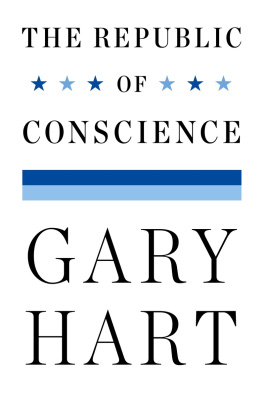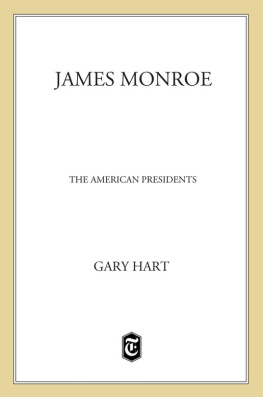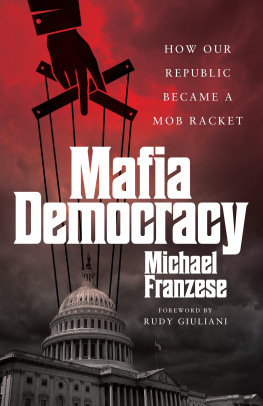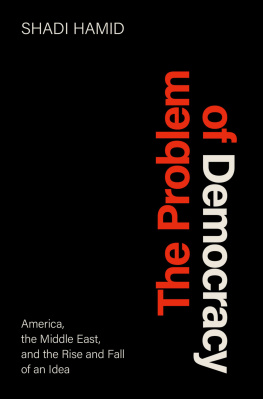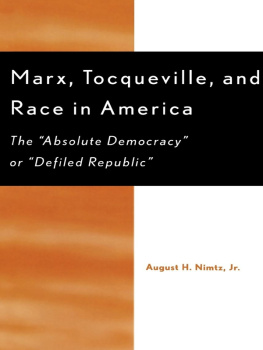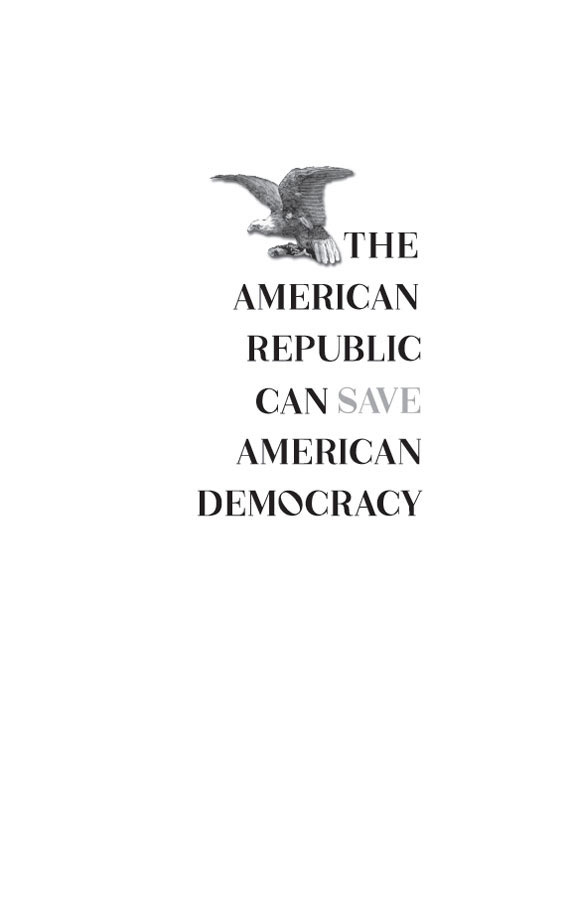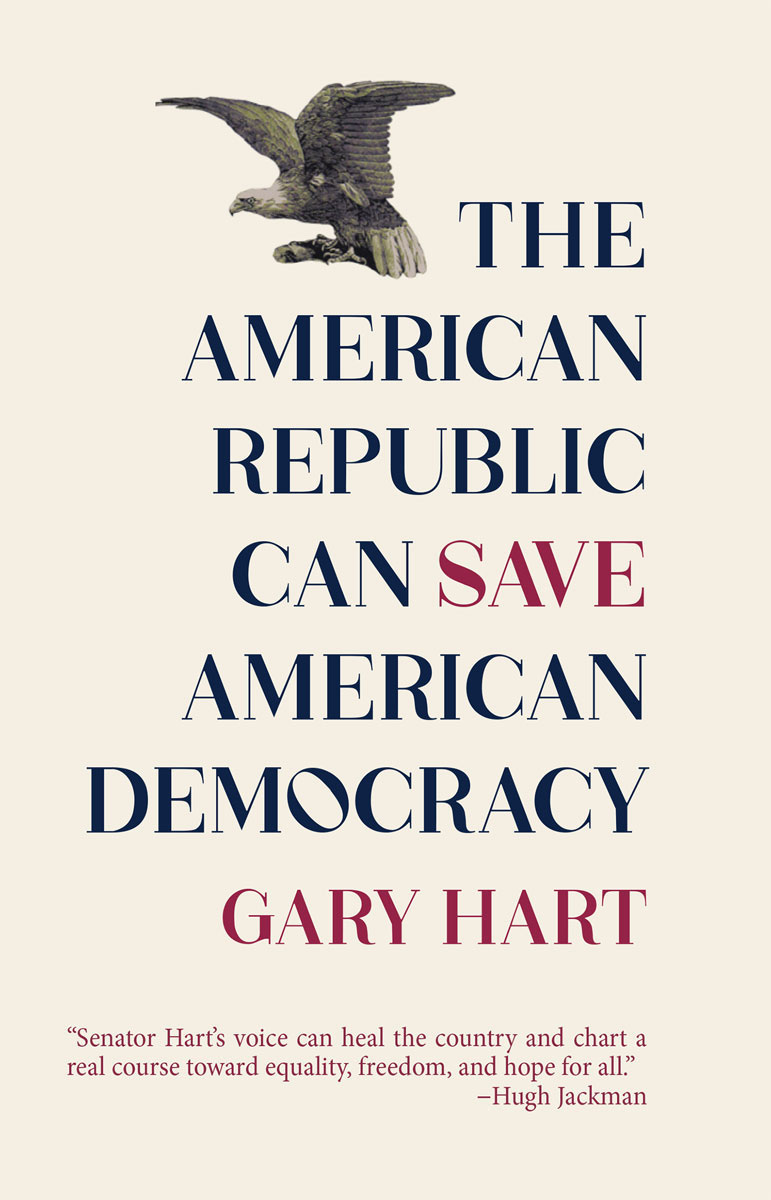

PRAISE FOR THE BOOK
Gary Harts intelligence is mixed with a gift for practicality and simplicity, and he is one of the most prescient and important voices in public life. This book is another incredible example of the power of Garys voice and how urgent the situation is right now for things to change. This essay examines how the restoration of the republic is the best way to save American democracy. Having read it, as well as having the privilege of sitting on his deck in Colorado talking with him, I am sure you will agree with me as to how lucky this country is to have Gary Harts voice, one that has been in service to this republic for most of his life. Senator Harts voice can heal the country and chart a real course toward equality, freedom, and hope for all.
Hugh Jackman
Gary Hart has always been a thoughtful man and he has written a thoughtful book; a warning, that teeters at times on the brink of despair. If the United States continues down the path that Donald Trump forged, Hart fears, then we are well on our way to losing our republic. If that prospect alarms you, read this slim volume and buy another copy for a friend.
Ted Koppel
Gary Harts eloquent call to action could not be more timely. This important new book makes a compelling argument that saving American democracy demands restoring our republic and reinvigorating the civic virtues that sustain it. At this moment of maximum peril, every patriotic American should read what Senator Hart has to say.
Laurence H. Tribe,
University Professor of Constitutional Law Emeritus,
Harvard University
In this clearly and vigorously written book, former Senator Gary Hart invokes the historic tradition of republicanism, with its prescriptions of popular sovereignty, anti-corruption, and civic virtue, as the best means for saving our beleaguered democracy. His words of wisdom are all the more effective and worth listening to because, as a scholar of history and a participant in government, Hart knows more than most of us about both the outside and the inside of our politics.
Gordon S. Wood,
Pulitzer Prize winner and author of The Radicalism of the American Revolution
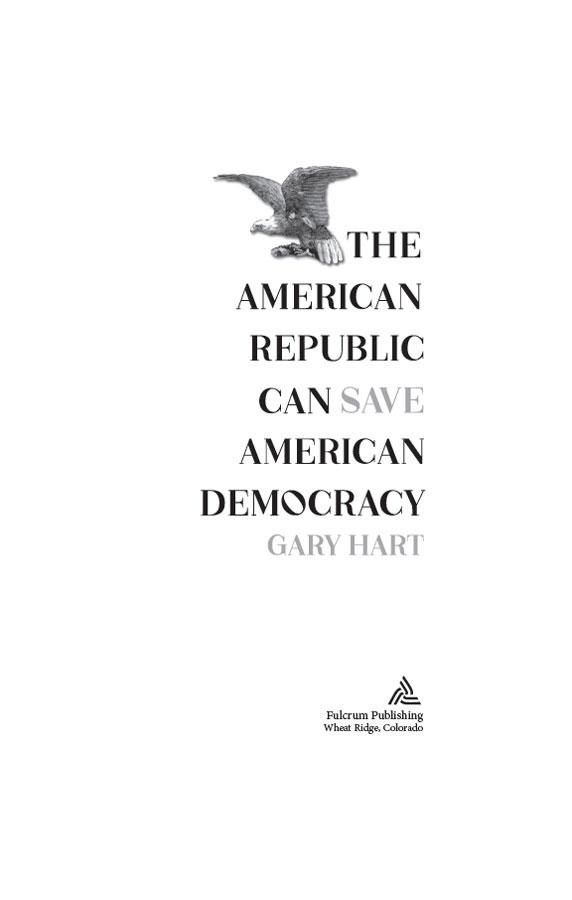
Copyright 2022
Gary Hart
All rights reserved. No part of this book may be reproduced, stored in a retrieval system, or transmitted in any form or by any means, electronic, mechanical, photocopying, recording, or otherwise, without the prior written permission of the publisher.
Library of Congress Cataloging-in-Publication Data
Names: Hart, Gary, 1936- author.
Title: The American republic can save American democracy / by Gary Hart.
Description: Wheat Ridge, Colorado : Fulcrum Publishing, 2022. | Includes
bibliographical references.
Identifiers: LCCN 2021059401 | ISBN 9781682753392 (paperback)
Subjects: LCSH: Democracy--United States. | Republicanism--United States. |
Political culture--United States.
Classification: LCC JK1726 .H377 2022 | DDC 320.973--dc23/eng/20220218
LC record available at https://lccn.loc.gov/2021059401
Printed in the United States
0 9 8 7 6 5 4 3 2 1
Fulcrum Publishing
3970 Youngfield Street
Wheat Ridge, Colorado 80033
(800) 992-2908 (303) 277-1623
www.fulcrumbooks.com
With loving memory of my beloved wife, Lee
I. THE AMERICAN REPUBLIC CAN SAVE AMERICAN DEMOCRACY
Restoration of the American Republic is vital now more than ever. For it is the qualities of the republic and the republican ideal that can save Americas democratic values from the looming threat of authoritarianism.
This essay is not an extended academic comparison and contrast of republics and democracies. That is for college political history textbooks. Rather it is an explication of the factors that have characterized republics since ancient Rome and that carried forward through the era of the Enlightenment into the learned minds of Americas Founders.
Those Founders chose the language and concepts of republicanism congenial to their historic creative process. A few of them, John Adams and Alexander Hamilton most notably, eschewed the notion of democracy, thinking of it primarily in terms of dangerous mobs in the streets and the French Revolution.
After more than two centuries since our founding, it is nothing less than amazing that political discourse in America employs democratic language almost exclusively, and outside the academy few can be found, even among educated Americans, who can provide a brief, cogent description of a republic, this even though we salute the American flag and the Republic for which it stands.
The case to be made here is that authoritarian forces are out to undermine and subvert the principles of democratic government, and the best defense of democracy is to be found, as our Founders knew, in the pillars of republican principles and ideals.
Although democracy has survived in America for more than 240 years, not always elegantly, the rise of populist nationalism here and in Europe and its increasing synchronization across the waters are evidence of potent threats that highlight democracys vulnerability. The culprits are uniformly held to be globalization and its unfair distribution of benefits, increased distance between a small wealthy elite (Davos man) and middle-class wage earners, mass migrations south to north, stagnation of opportunity, alienation of everyday citizens from the political class, the consequent rise of the right, a tilt toward authoritarianism, and much else.
The rise of populist nationalism and its erosion of democracy is increasingly well documented but with little suggestion of how to save democracy.
Here, the confusion over whether America is a democracy or a Republic, or both, may offer a path. Earlier this year the New York Times reported on a squabble in Michigan over whether the United States was a republic or a democracy. Of course, it took Thomas Jefferson to coin the phrase a democratic republic.
Our Founders proclaimed the new nation a Republic but one with a democratic form of government. It is timely to consider whether the former may save the latter.
II. THE QUALITIES AND VIRTUES OF REPUBLICS
Whereas democracies focus on equality, justice, and other rights, the qualities of republics throughout history include popular sovereignty, a sense of the common good, resistance to corruption, and civic virtue.
We assume centers of power, and therefore political authority, to be in both Washington, D.C., politically, and New York, financially. Media power used to be centered in New York as well, at least until the advent of social media, which now seems centered in Silicon Valley.
Instead, in a Republic such as ours power is not located in these places. It is dispersed throughout the country. It belongs to us, the people, who are sovereign in this Republic. In this democracy we do routinely select representatives to promote and protect our individual and national interests. But they are ultimately accountable to us who are the sovereigns.


